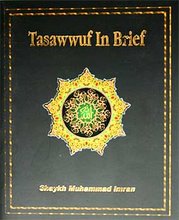Saturday 19 September 2009
Hold on to Four Things...
My Respected Teacher left us with four things to hold on to on what was possibly the last night of the blessed month of Ramadan. Four things, which if we hold on to, my Respected Teacher said we would find it easier to stay on the beautiful straight path of Islam, and to stay away from sin and disobedience to our Creator. They are:
1) Recitation of the Noble Qur'an- even if it be that we only recite FIVE lines, but to ensure that we are steadfast upon it, reciting a small fixed amount EVERYDAY.
2) Sending Salat ala l'Nabi -salutations upon the Prophet (Allah bless him and give him peace) as often as we can; sitting, standing, lying down, walking- as much as possible.
3) Contemplation- of the blessings of Allah Most High upon us, of death, of the purpose of our life and creation.
4) Dhikr - constant rememberance of Allah Most High; to make a habit of saying Bismillah (in the name of Allah) when doing anything, to say Alhamdulillah (all praises are for Allah) after completing anything. Even better, would be to read the ad'iyah (supplications) that the Prophet (Allah bless him and give him peace) taught us to read at the time of carrying out any task, or completing a task etc.
1) Recitation of the Noble Qur'an- even if it be that we only recite FIVE lines, but to ensure that we are steadfast upon it, reciting a small fixed amount EVERYDAY.
2) Sending Salat ala l'Nabi -salutations upon the Prophet (Allah bless him and give him peace) as often as we can; sitting, standing, lying down, walking- as much as possible.
3) Contemplation- of the blessings of Allah Most High upon us, of death, of the purpose of our life and creation.
4) Dhikr - constant rememberance of Allah Most High; to make a habit of saying Bismillah (in the name of Allah) when doing anything, to say Alhamdulillah (all praises are for Allah) after completing anything. Even better, would be to read the ad'iyah (supplications) that the Prophet (Allah bless him and give him peace) taught us to read at the time of carrying out any task, or completing a task etc.
Tuesday 15 September 2009
Mysteries of the Five Pillars of Islam
My respected teacher mentioned in his talk on Monday (14/9/2009):
The five pillars of Islam are: Shahadah (testification of faith), Salah (daily prayers), Saum (fasting), Zakah (alms) and Hajj (pilgrimage).
If we look into the realities of each pillar we find that two of the pillars are required to be discreet, two are required to be out in the open, and one should be publicised totally!
As for the two that should be discreet, they are: Saum and Zakah.
When one fasts, it is impossible for an onlooker to recognise that this person is fasting, nor should the one who is fasting inform anyone.
As for the giving of charity, it is required to be done so secretly that the "right hand does not know what the left hand is giving".
As for the two that should be out in the open, they are: Salah and Hajj.
It is preferred that the obligatory prayers are offerred in the mosque, with congregation.
As for the pilgrimage, it is performed in one place, where all pilgrims are required to gather. Thus, for both, there is no command to hide when carrying them out.
As for the one that must be declared even more openly, it is: the Shahadah- that, after one believes in Allah Most High and all the articles of faith, he verbally gives testimony to his faith saying, for example: "I bear witness that there is none worthy of worship besides Allah, and I bear witness that Muhammad (Allah bless him and give him peace) is His final messenger."
Golden Point to note: The one common factor in the four pillars that are of worship, is that Allah Most High has commanded us to either remain totally silent, or at least keep careful control of our tongues.
In Salah if one speaks, his prayer is nullified. The Prophet (Allah bless him and give him peace) said: "This is salah. Any speech of people does not befit it; it is only [comprised of] glorification, proclaiming Allah's greatness, and the recitation of the Qur'an." (Muslim: 537)
Whilst fasting, if a person speaks vulgarities and obscene language he loses the spiritual effects of the fast as well as the full reward, though the obligation will be lifted. This is learnt from the Prophet's (Allah bless him and give him peace) statement, on the authority of Abu Hurairah (Allah be pleased with him): "Whoever does not leave speaking wrongly and acting accordingly, Allah has no need for him to leave his food and drink." (Bukhari: 1903)
~According to some scholars, ones fast is actually nullified by sinning with the tongue.
As for Zakah, and other forms of charity, Allah Most High gives the following command regarding them: "O you who believe, do not nullify your acts of charity by boasting about (doing people a) favour and by causing (them) hurt..." (Qur'an, 2:264)
As for Hajj, Allah Most High says in the Noble Qur'an: "...So whoever undertakes Hajj in them (i.e. the months of Hajj), there should be no obscenity, no sin, no quarrell in the Hajj..." (Qur'an, 2:197)
The lesson we learn is: "Control your tongue." (Tirmidhi: 2406) "Whoever believes in Allah and the last day should speak good, or remain silent." (Bukhari: 6018)
The five pillars of Islam are: Shahadah (testification of faith), Salah (daily prayers), Saum (fasting), Zakah (alms) and Hajj (pilgrimage).
If we look into the realities of each pillar we find that two of the pillars are required to be discreet, two are required to be out in the open, and one should be publicised totally!
As for the two that should be discreet, they are: Saum and Zakah.
When one fasts, it is impossible for an onlooker to recognise that this person is fasting, nor should the one who is fasting inform anyone.
As for the giving of charity, it is required to be done so secretly that the "right hand does not know what the left hand is giving".
As for the two that should be out in the open, they are: Salah and Hajj.
It is preferred that the obligatory prayers are offerred in the mosque, with congregation.
As for the pilgrimage, it is performed in one place, where all pilgrims are required to gather. Thus, for both, there is no command to hide when carrying them out.
As for the one that must be declared even more openly, it is: the Shahadah- that, after one believes in Allah Most High and all the articles of faith, he verbally gives testimony to his faith saying, for example: "I bear witness that there is none worthy of worship besides Allah, and I bear witness that Muhammad (Allah bless him and give him peace) is His final messenger."
Golden Point to note: The one common factor in the four pillars that are of worship, is that Allah Most High has commanded us to either remain totally silent, or at least keep careful control of our tongues.
In Salah if one speaks, his prayer is nullified. The Prophet (Allah bless him and give him peace) said: "This is salah. Any speech of people does not befit it; it is only [comprised of] glorification, proclaiming Allah's greatness, and the recitation of the Qur'an." (Muslim: 537)
Whilst fasting, if a person speaks vulgarities and obscene language he loses the spiritual effects of the fast as well as the full reward, though the obligation will be lifted. This is learnt from the Prophet's (Allah bless him and give him peace) statement, on the authority of Abu Hurairah (Allah be pleased with him): "Whoever does not leave speaking wrongly and acting accordingly, Allah has no need for him to leave his food and drink." (Bukhari: 1903)
~According to some scholars, ones fast is actually nullified by sinning with the tongue.
As for Zakah, and other forms of charity, Allah Most High gives the following command regarding them: "O you who believe, do not nullify your acts of charity by boasting about (doing people a) favour and by causing (them) hurt..." (Qur'an, 2:264)
As for Hajj, Allah Most High says in the Noble Qur'an: "...So whoever undertakes Hajj in them (i.e. the months of Hajj), there should be no obscenity, no sin, no quarrell in the Hajj..." (Qur'an, 2:197)
The lesson we learn is: "Control your tongue." (Tirmidhi: 2406) "Whoever believes in Allah and the last day should speak good, or remain silent." (Bukhari: 6018)
Wednesday 9 September 2009
Saturday 5 September 2009
Value Imaan
My Respected Teacher began by mentioning the importance of continuosly remembering death in order to create the conciousness to prepare for that inevitable time.
The famous saying: you will be resurrected as you died, and you will die as you lived your life is a reminder of the fact that if a person lives his life as a practicing believer, he will die as a believer and hence, be resurrected as a believer. Whereas, if a person lives his life practicing the ways of the disbelievers, he will die in this poor state and be resurrected in this terrible state. Allah save us!
So, being believers at present we may be fooled into thinking that we are automatically guaranteed death as believers. No, this is not the case. It often happens, that during his lifetime a person is guilty of perpertrating such acts that at the end of his life Allah Most High snatches away this priceless gift: Imaan.
To value this gift is of utmost importance. The value of Imaan can be learnt from those people who were not born as Muslims, but thereafter Allah Most High blessed them with Imaan, after which they practice upon the teachings of Islam.
All that we do throughout our life strengthens and weakens our Imaan. The more a person dettaches himself away from the Religion, the weaker his Imaan becomes, and very easily a day may come when Imaan no longer remains inside him, and he leaves this world to meet Allah Most High in a state of disbelief. Allah save us!
The famous saying: you will be resurrected as you died, and you will die as you lived your life is a reminder of the fact that if a person lives his life as a practicing believer, he will die as a believer and hence, be resurrected as a believer. Whereas, if a person lives his life practicing the ways of the disbelievers, he will die in this poor state and be resurrected in this terrible state. Allah save us!
So, being believers at present we may be fooled into thinking that we are automatically guaranteed death as believers. No, this is not the case. It often happens, that during his lifetime a person is guilty of perpertrating such acts that at the end of his life Allah Most High snatches away this priceless gift: Imaan.
To value this gift is of utmost importance. The value of Imaan can be learnt from those people who were not born as Muslims, but thereafter Allah Most High blessed them with Imaan, after which they practice upon the teachings of Islam.
All that we do throughout our life strengthens and weakens our Imaan. The more a person dettaches himself away from the Religion, the weaker his Imaan becomes, and very easily a day may come when Imaan no longer remains inside him, and he leaves this world to meet Allah Most High in a state of disbelief. Allah save us!
May Allah grant us death upon Imaan.
Peace In Your Life
The scores of youth gathered at the Jami' Masjid, Leicester, for a night of spiritual upliftment, held by my Respected Teacher Shaykh Muhammad Imran, were addressed this week by his esteemed father, Shaykh Mawlana Adam (Allah preserve them).
The honoured Shaykh spoke for approximately ten minutes. A brief insight to his talk is as follows:
On the other hand, if a person is negligent of the commands of Allah Most High, he will find himself distressed and in anguish when calamities befall him- though they may be the same as those that an obedient servant is afflicted with.
He gave the following example to explain the above mentioned point: There are two bananas; one real, and one a plastic one. On the face of it, they both look exactly the same. However, the reality is that one is a sweet nutritious fruit and the other is of no use, rather it could be harmful.
The honoured Shaykh spoke for approximately ten minutes. A brief insight to his talk is as follows:
- Firstly, he expressed his great joy at seeing such a large gathering of youngsters in the mosque at such a light time of the night. He explained that it was a sign of the love of Allah Most High for those who He had given the ability to attend such a gathering.
- Thereafter, he went on to say that the life of this world is one filled with trials and troubles. They come upon everyone and no one can totally escape them. However, if a Believer is obedient to Allah Most High and he strives to follow the teachings of Islam he will find that despite afflictions befalling him, he is content and at ease in his heart.
On the other hand, if a person is negligent of the commands of Allah Most High, he will find himself distressed and in anguish when calamities befall him- though they may be the same as those that an obedient servant is afflicted with.
He gave the following example to explain the above mentioned point: There are two bananas; one real, and one a plastic one. On the face of it, they both look exactly the same. However, the reality is that one is a sweet nutritious fruit and the other is of no use, rather it could be harmful.
- Finally, the Shaykh stated that if the youth do not rectify their ways now, their wrong ways will rub off onto their children in future, and their children will become unruly and disobedient- and this will be a cause of great distress for a person in the later years of his life.
May Allah grant us the ability to become obedient servants to Him.
Subscribe to:
Posts (Atom)





